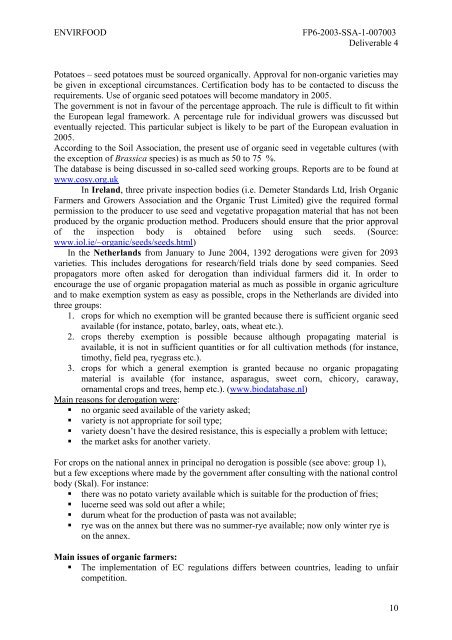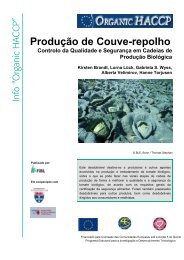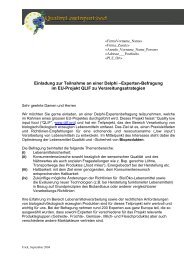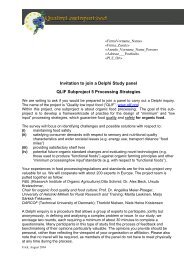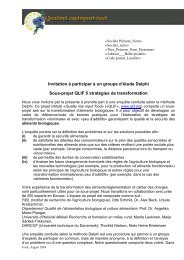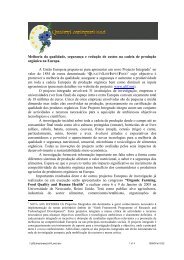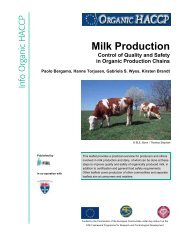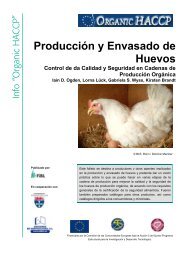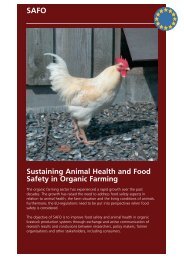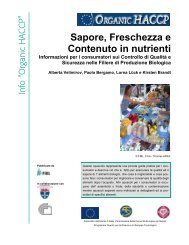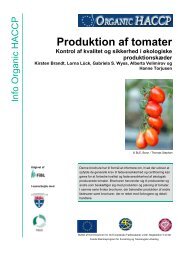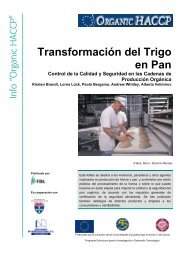ORGANIC SEED PROPAGATION: CURRENT STATUS AND ...
ORGANIC SEED PROPAGATION: CURRENT STATUS AND ...
ORGANIC SEED PROPAGATION: CURRENT STATUS AND ...
You also want an ePaper? Increase the reach of your titles
YUMPU automatically turns print PDFs into web optimized ePapers that Google loves.
ENVIRFOOD<br />
FP6-2003-SSA-1-007003<br />
Deliverable 4<br />
Potatoes – seed potatoes must be sourced organically. Approval for non-organic varieties may<br />
be given in exceptional circumstances. Certification body has to be contacted to discuss the<br />
requirements. Use of organic seed potatoes will become mandatory in 2005.<br />
The government is not in favour of the percentage approach. The rule is difficult to fit within<br />
the European legal framework. A percentage rule for individual growers was discussed but<br />
eventually rejected. This particular subject is likely to be part of the European evaluation in<br />
2005.<br />
According to the Soil Association, the present use of organic seed in vegetable cultures (with<br />
the exception of Brassica species) is as much as 50 to 75 %.<br />
The database is being discussed in so-called seed working groups. Reports are to be found at<br />
www.cosy.org.uk<br />
In Ireland, three private inspection bodies (i.e. Demeter Standards Ltd, Irish Organic<br />
Farmers and Growers Association and the Organic Trust Limited) give the required formal<br />
permission to the producer to use seed and vegetative propagation material that has not been<br />
produced by the organic production method. Producers should ensure that the prior approval<br />
of the inspection body is obtained before using such seeds. (Source:<br />
www.iol.ie/~organic/seeds/seeds.html)<br />
In the Netherlands from January to June 2004, 1392 derogations were given for 2093<br />
varieties. This includes derogations for research/field trials done by seed companies. Seed<br />
propagators more often asked for derogation than individual farmers did it. In order to<br />
encourage the use of organic propagation material as much as possible in organic agriculture<br />
and to make exemption system as easy as possible, crops in the Netherlands are divided into<br />
three groups:<br />
1. crops for which no exemption will be granted because there is sufficient organic seed<br />
available (for instance, potato, barley, oats, wheat etc.).<br />
2. crops thereby exemption is possible because although propagating material is<br />
available, it is not in sufficient quantities or for all cultivation methods (for instance,<br />
timothy, field pea, ryegrass etc.).<br />
3. crops for which a general exemption is granted because no organic propagating<br />
material is available (for instance, asparagus, sweet corn, chicory, caraway,<br />
ornamental crops and trees, hemp etc.). (www.biodatabase.nl)<br />
Main reasons for derogation were:<br />
• no organic seed available of the variety asked;<br />
• variety is not appropriate for soil type;<br />
• variety doesn’t have the desired resistance, this is especially a problem with lettuce;<br />
• the market asks for another variety.<br />
For crops on the national annex in principal no derogation is possible (see above: group 1),<br />
but a few exceptions where made by the government after consulting with the national control<br />
body (Skal). For instance:<br />
• there was no potato variety available which is suitable for the production of fries;<br />
• lucerne seed was sold out after a while;<br />
• durum wheat for the production of pasta was not available;<br />
• rye was on the annex but there was no summer-rye available; now only winter rye is<br />
on the annex.<br />
Main issues of organic farmers:<br />
• The implementation of EC regulations differs between countries, leading to unfair<br />
competition.<br />
10


